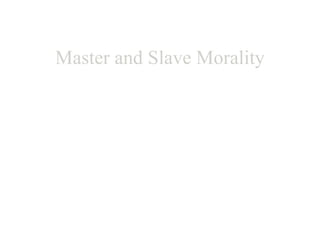
Msmorality
- 1. Master and Slave Morality Freidrich Nietzsche ‘ Conscious of the truth he has once seen, man now sees everywhere only the horror or the absurdity of existence.’ Ibid p. 60
- 2. Nietzsche’s greatest influence was Arthur Schopenhauer. Schopenhauer believed that there was a division between appearance and reality. The true reality was our ‘wills’ and that everything we experienced was an illusion that served to illustrate what our wills were striving towards. The only reason we live is to fulfill our will’s desires, which include eating, drinking, sleeping, and so forth. However, even when we satiate these desires they eventually return. Because of this Schopenhauer believed that life was perpetual suffering.
- 3. Nietzsche initially embraced this view but then moved on to a different standpoint. Nietzsche believed that the world was a horrible, chaotic place that should be acknowledged as such, and that the proper way to deal with the absurdity of existence was through art.
- 4. Nietzsche’s idea of art included oneself as an artist, a spectator and our own work of art. In other words, he was a proponent of ‘creating oneself’ according to ones own ultimate plan.
- 5. The original barbarians (‘masters,’) who started civilization, ran around and did what they wanted because they were stronger and healthier than everyone else. They beat others up, took what they wanted, and generally whooped it up just because they could. The weaker people (‘slaves,’) who were generally more intelligent, got sick of getting beat up and found a way to stop the barbarians from beating them up. They convinced the barbarians that what they were doing was “wrong” and that they were doing things that were morally “evil”. This is where slave-master morality comes from.
- 7. Fight Club - the slave character defines himself by his possessions
- 9. Fight Club - Tyler Durden is an example of master morality, a character unafraid to challenge convention and accept the chaos and darkness of the world
- 10. Tyler challenges ‘the main character’ to face the pain of existence
- 11. Do you think we live in a society of slaves, or masters?